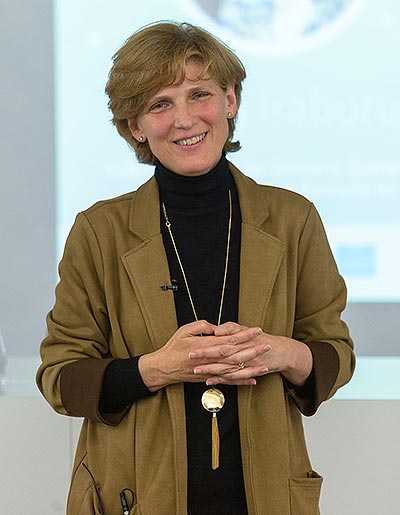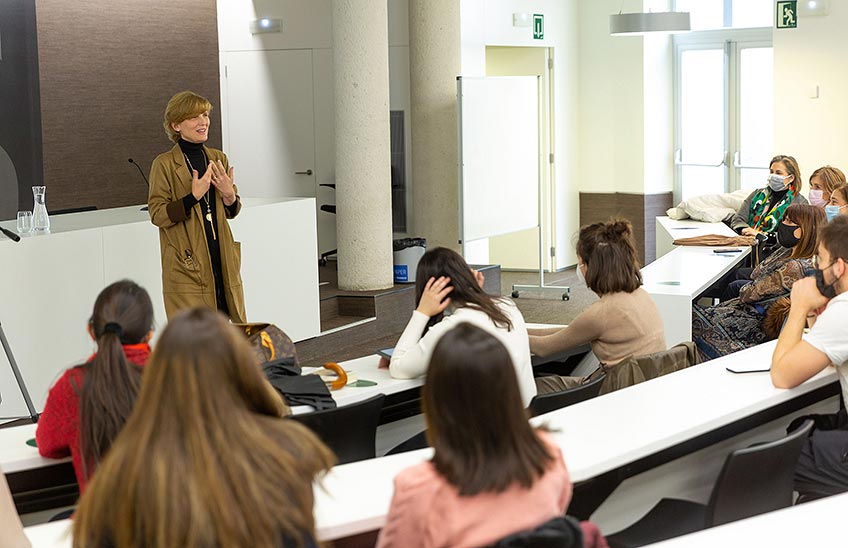Think
Women's leadership skills: María Iraburu Elizalde
Eva María Infante, 2nd year student of Degree in Philosophy, Politics and y Economics (PPE), brings us the chronicle of the penultimate session of the cycle "Leadership skills for women". On this occasion, she had a very special guest: María Iraburu, Rector of the University of Navarra.

Last Friday, April 1, the penultimate session of the Women's Leadership Skills Cycle was held. On this occasion, we were fortunate to have the testimony of María Iraburu, president of the University of Navarra since last January.
It was, as always, a close and relaxed talk, but on this occasion it had a special element. The Female Leadership Skills Cycle was born with the idea of being able to bring female referents from different professional fields to student body and this last session provided the opportunity to meet María Iraburu, a reference for the students of the University, not only as president, but also as a person and as an example of female leadership. For many, it was an opportunity to learn about university governance from a close and personal perspective staff.
 Iraburu wanted to make this clear from the outset: you learn from stories and that is why it is important to tell them.. Among those who inspired him, he highlighted his mother as an example of leadership, but he also wanted to emphasise that no story is individual, but that they are all part of a chain of influences and that, therefore, we all have the possibility to make a positive impact on others.
Iraburu wanted to make this clear from the outset: you learn from stories and that is why it is important to tell them.. Among those who inspired him, he highlighted his mother as an example of leadership, but he also wanted to emphasise that no story is individual, but that they are all part of a chain of influences and that, therefore, we all have the possibility to make a positive impact on others.
She has been in love with the University of Navarra and its university spirit since her first year of Biology, and she urged those present to never abandon the attitude of questioning, because even though she comes from the natural sciences, she understands the need to ask questions about the latest causes and major issues. As a lecturer, she hinted at how nice it is for mentors to be able to see how their students evolve and, from her time in university government, she highlighted the possibility of getting to know the institutions as a whole and of launching significant projects that have an impact on society.
She left us with three fundamental pieces of advice: firstly, that life is a path through the forest and that as you cross it you grow; secondly, the importance of being advised by people who have more experience and perspective and the vital role of a mentor; lastly, that a leader has many faces. For her, the leader is a reliable, approachable person who is willing to seek the good of the whole. The leader is not the "I", but the one who is able to see the "we". He or she must have the vocation to help and contribute.
Her testimony gave rise to a multitude of questions, of which I would like to highlight one in particular: women helping women. María told us that her researcher degree programhad been marked by women leaders and highlighted the importance she attached to supporting the women around her, both when it came to organising panels and presentations on equal terms, and when it came to giving up a simple turn to speak. Anecdotally, only 15% of rectors' offices in Spain are headed by women, and two of the possible causes mentioned were the difficulty of finding female leaders in certain positions and the insufficiency of support networks.
Personally, I'm left with two ideas from the talk. The first is the importance of telling stories and finding role models. Undoubtedly, we all have great examples nearby, but on many occasions, girls have lacked female role models in some professional fields. It is in our hands that future generations have where to look and can see themselves reflected and that, in part, will depend on our ability to inspire them. The second idea is the importance of helping to promote and boost the careers of other women. Informal networks have an undoubted weight in many professional fields. That is why it is essential to weave support networks and to keep in mind not only the names of colleagues, but also of female colleagues.

At summary, if life is a road on which we do not know the end, the best thing we can do is to help our fellow travellers and, as far as possible, make the journey more pleasant for others. So the day may come, as María Iraburu said in an interview for the Diario de Navarra, when being the first is no longer news.
If you liked the article, you might be interested in one of our Degrees!









